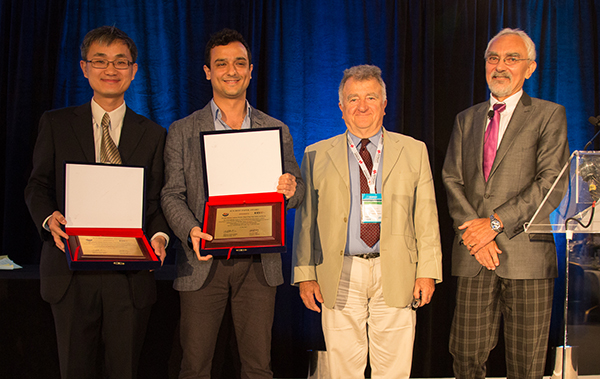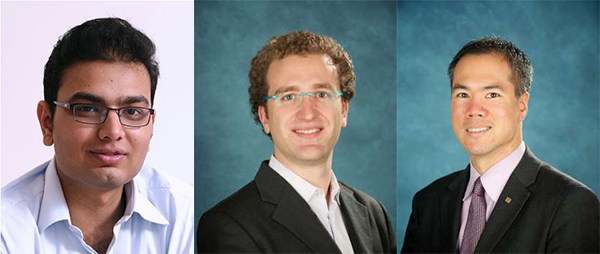
July 14, 2017
Yu wins 2017 Journal of Communications and Networks (JCN) Best Paper Award
A paper co-authored by Professor Wei Yu of the Edward S. Rogers Sr. Department of Electrical & Computer Engineering (ECE) received the 2017 Journal of Communications and Networks (JCN) Best Paper Award. The award was presented during the Awards Luncheon of the 2017 IEEE International Conference on Communications (ICC), held May 21-25, 2017 in Paris, France.
The paper, entitled “Cloud Radio Access Network: Virtualizing Wireless Access for Dense Heterogeneous Systems,” was published in the Journal of Communications and Networks’ (JCN) April 2016 Issue and it provides an overview of a novel network architecture called cloud radio-access network (C-RAN) for the next generation of wireless communications networks. C-RAN refers to the software virtualization of the base-station functionalities in cellular networks by means of cloud computing techniques. This results in a centralized architecture on which advanced signal processing algorithms for resource allocation and interference management can be implemented.
The paper is co-authored by experts in both academia and industry, and, uniquely, the five authors come from five different countries: the U.S., Germany, China, U.K., and Canada.
Rose, Rodionov and Biancolin win Best Paper of 2016 Award from ACM Transactions on Reconfigurable Technology and Systems (TRETS)
Professor Jonathan Rose, ECE PhD candidate Alex Rodionov, and David Biancolin of Electrical Engineering and Computer Sciences at UC Berkley were honoured with the award for Best Paper of 2016 from top FPGA journal ACM Transactions on Reconfigurable Technology and Systems (TRETS).
Their paper, “Fine-Grained Interconnect Synthesis” addresses one of the key challenges of the FPGA industry: making the task of designing hardware easier. They are achieving this with their new interconnect synthesis and system integration tool, GENeric Interconnect Engine (GENIE), which automates the creation of interconnect pathways between functional structures.
“Our long-term goal is to automate and optimize interconnect for all levels of design granularity, but in this paper, we focussed on fine-grained interconnect.” says Rose, “We were surprised and delighted at the recognition.”

Patel, Triverio and Hum win Best Paper Award at the 21st IEEE Workshop on Signal and Power Integrity (SPI)
ECE PhD candidate Utkarsh Patel, supervised by Professor Piero Triverio and Professor Sean Hum won the Best Student Paper Award at the 21st IEEE Workshop on Signal and Power Integrity (SPI) held May 7-10, 2017 in Italy. The conference is a forum of exchange on the latest development on design, characterization, modeling, simulation and testing for Signal and Power Integrity at chip, package, board and system level.
The winning paper, “A Magneto-Quasi-Static Surface Formulation to Calculate the Impedance of 3D Interconnects with Arbitrary Cross-section” focussed on modeling interconnect on electronic boards and packages, presenting a technique that reduces computational complexity. “In comparison to many other interconnect characterization methods, our method consumes less memory and requires less time to model interconnects,” say Patel, “This will ultimately enable the simulation of larger and more complex interconnects.”
Xu wins the Outstanding Dissertation Award
Dr. Feihu Xu (PhD 0T4), received the Outstanding Dissertation Award at the 2016 International Organization of Chinese Physicist and Astronomers (OCPA) conference.
Dr. Xu received this award for his outstanding PhD thesis work on quantum information, particularly quantum cryptography, where he has made key contributions to both the theory and experiment of quantum cryptography. Dr. Xu, who was co-supervised by Professors Hoi-Kwong Lo and Li Qian, was among the first to hack successfully a commercial quantum key distribution system, and the first in the world to implement experimentally a loss-tolerant protocol that takes encoding flaws in quantum key distribution into account. He is currently a postdoctoral researcher at MIT with an NSERC Postdoctoral Fellowship Award.
The OCPA is a conference for Chinese Physicists worldwide held every two years and the organization aims to promote physics and astronomy research in general and recognition of achievements by ethnic Chinese physicists and astronomers in particular.
Betz, Tatsumura and Yazdanshenas win Best Paper Award at FPT 2016
Professor Vaughn Betz, Sadegh Yazdanshenas, ECE PhD Candidate, and Kosuke Tatsumura, a research scientist in the Advanced LSI Technology Laboratory at Toshiba, received a Best Paper Award for their paper entitled “High-Density, Low Energy, Magnetic Tunnel Junction Based Block RAMs for Memory Rich FPGAs” at the IEEE International Conference on Field-Programmable Technology, Xi’an, China.
This collaboration with Toshiba was enabled by Dr. Tatsumura’s visit to U of T where he worked with Professor Betz and his group to investigate the incorporation of a new (magnetic) type of memory into (electronic) Field Programmable Gate Array chips to leverage their respective benefits.
The International Conference on field-Programmable Technology (FPT) is the premier conference in the Asia-Pacific region on field-programmable technologies including reconfigurable computing devices and systems containing such components.
Paper by Sarris and Sharma featured on cover of the Journal of Applied Physics
A paper by Professor Costas Sarris and Shashwat Sharma (ECE MASc 1T6) entitled “Inversely-designed printed microwave ablation antenna for controlled temperature profile synthesis” was featured on the cover of the Journal of Applied Physics of the American Institute of Physics.
This paper presents a multiphysics optimization methodology for microwave ablation antennas. These antennas can be employed for the ablation of cancerous tumours, but may harm benign tissue surrounding the area of ablation. The approach posited in this paper and another entitled “A Novel Multiphysics Optimization-Driven Methodology for the Design of Microwave Ablation Antennas,” published in the IEEE Journal of Multiphysics and Multiscale Computational Techniques, allows for better control of the thermal profile generated by the antenna and proposes a new class of ablation antennas that allows one to reconfigure the antenna to generate a desired thermal profile inside the tissue.
More information:
Jessica MacInnis
Senior Communications Officer
The Edward S. Rogers Sr. Department of Electrical & Computer Engineering
416-978-7997; jessica.macinnis@utoronto.ca